高中英语语法-省略句
- 格式:ppt
- 大小:1.64 MB
- 文档页数:30
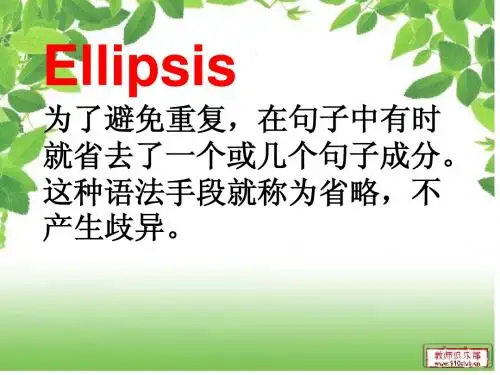
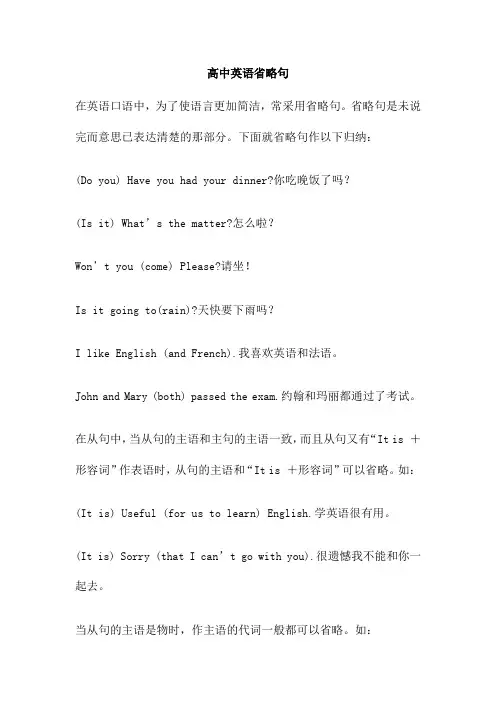
高中英语省略句在英语口语中,为了使语言更加简洁,常采用省略句。
省略句是未说完而意思已表达清楚的那部分。
下面就省略句作以下归纳:(Do you) Have you had your dinner?你吃晚饭了吗?(Is it) What’s the matter?怎么啦?Won’t you (come) Please?请坐!Is it going to(rain)?天快要下雨吗?I like English (and French).我喜欢英语和法语。
John and Mary (both) passed the exam.约翰和玛丽都通过了考试。
在从句中,当从句的主语和主句的主语一致,而且从句又有“It is +形容词”作表语时,从句的主语和“It is +形容词”可以省略。
如:(It is) Useful (for us to learn) English.学英语很有用。
(It is) Sorry (that I can’t go with you).很遗憾我不能和你一起去。
当从句的主语是物时,作主语的代词一般都可以省略。
如:The book (that I read yesterday) is very interesting.我昨天读的那本书很有趣。
在定语从句中,当先行词在定语从句中作状语时,关系代词可以省略。
如:The way (that/which) we use is more convenient.我们使用的方法更简便。
The reason (why) he was late is that he had to help the old lady across the street.他迟到的原因是他得帮助那位老太太过马路。
在一些表示建议、请求、命令等含义的动词后的宾语从句中,谓语动词常省略。
如:I suggest (that) we (should) discuss the matter.我建议我们讨论这个问题。
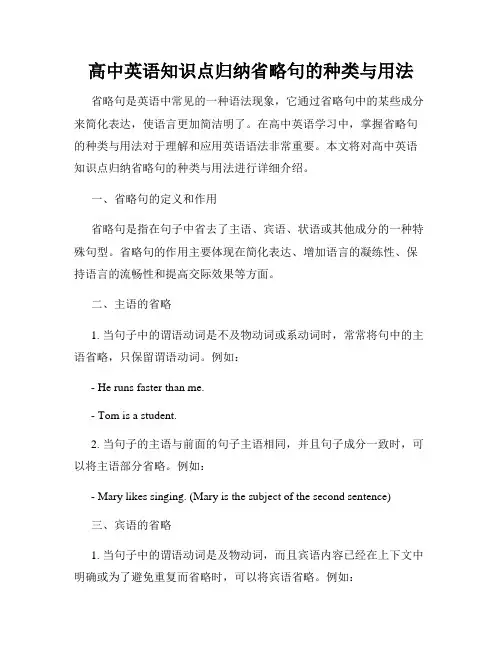
高中英语知识点归纳省略句的种类与用法省略句是英语中常见的一种语法现象,它通过省略句中的某些成分来简化表达,使语言更加简洁明了。
在高中英语学习中,掌握省略句的种类与用法对于理解和应用英语语法非常重要。
本文将对高中英语知识点归纳省略句的种类与用法进行详细介绍。
一、省略句的定义和作用省略句是指在句子中省去了主语、宾语、状语或其他成分的一种特殊句型。
省略句的作用主要体现在简化表达、增加语言的凝练性、保持语言的流畅性和提高交际效果等方面。
二、主语的省略1. 当句子中的谓语动词是不及物动词或系动词时,常常将句中的主语省略,只保留谓语动词。
例如:- He runs faster than me.- Tom is a student.2. 当句子的主语与前面的句子主语相同,并且句子成分一致时,可以将主语部分省略。
例如:- Mary likes singing. (Mary is the subject of the second sentence)三、宾语的省略1. 当句子中的谓语动词是及物动词,而且宾语内容已经在上下文中明确或为了避免重复而省略时,可以将宾语省略。
例如:- Can you speak French? Yes, I can. (French is the object of speak)四、状语的省略1. 当句子中的状语从句与主句的主语或宾语一致时,可以将状语从句中的主语或宾语省略。
例如:- He speaks English better than I (do). (I is the subject of do)- She likes swimming more than her sister (does). (Her sister is the subject of does)2. 当句子中的状语从句与主句的谓语动词一致时,可以将状语从句中的谓语动词省略。
例如:- I work harder than you (do). (Do is the verb of the subordinate clause)五、被动语态的省略1. 当句子中的被动语态中的被动助动词和be动词前面有介词时,可以将be动词和介词省略。
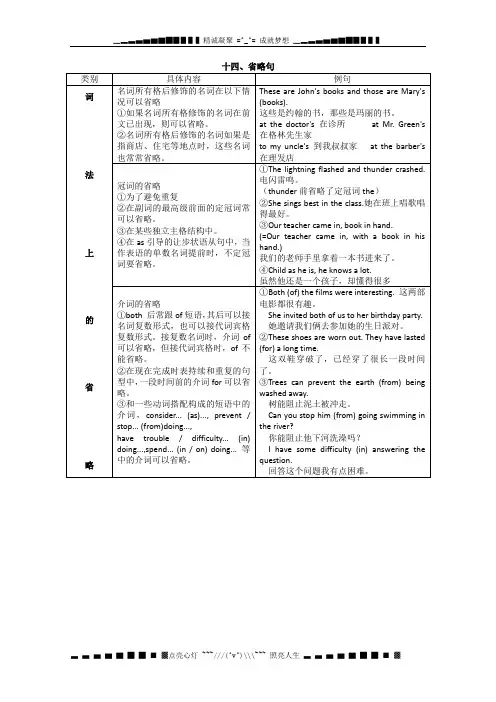
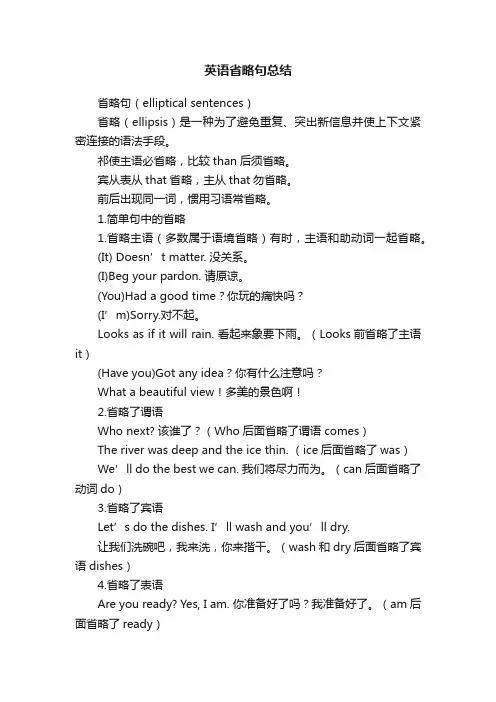
英语省略句总结省略句(elliptical sentences)省略(ellipsis)是一种为了避免重复、突出新信息并使上下文紧密连接的语法手段。
祁使主语必省略,比较than后须省略。
宾从表从that省略,主从that勿省略。
前后出现同一词,惯用习语常省略。
1.简单句中的省略1.省略主语(多数属于语境省略)有时,主语和助动词一起省略。
(It) Doesn’t matter. 没关系。
(I)Beg your pardon. 请原谅。
(You)Had a good time?你玩的痛快吗?(I’m)Sorry.对不起。
Looks as if it will rain. 看起来象要下雨。
(Looks前省略了主语it)(Have you)Got any idea?你有什么注意吗?What a beautiful view!多美的景色啊!2.省略了谓语Who next? 该谁了?(Who后面省略了谓语comes)The river was deep and the ice thin. (ice后面省略了was)We’ll do the best we can. 我们将尽力而为。
(can后面省略了动词do)3.省略了宾语Let’s do the dishes. I’ll wash and you’ll dry.让我们洗碗吧,我来洗,你来揩干。
(wash和dry后面省略了宾语dishes)4.省略了表语Are you ready? Yes, I am. 你准备好了吗?我准备好了。
(am后面省略了ready)He was a lover of sports as he had been in his youth.他还是象年轻时那样,是一位运动爱好者。
(had been后面省略了a lover of sports)5.省略了状语He was not hurt. Strange! 他没有受伤,真奇怪!(Strange前面省略了状语how)6.同时省掉句子几个成份。
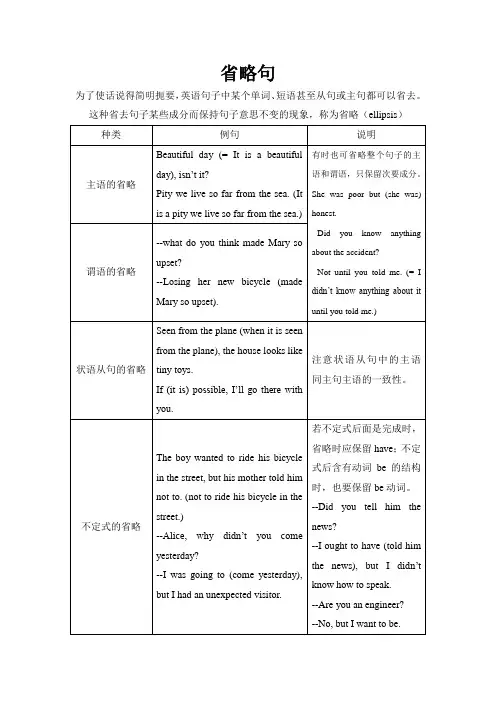
省略句为了使话说得简明扼要,英语句子中某个单词、短语甚至从句或主句都可以省去。
这种省去句子某些成分而保持句子意思不变的现象,称为省略(ellipsis)Ⅰ、状语从句中的省略用法一、如果从句的主语和主句的主语一致,且从句的谓语含有be动词的某种形式(am/is/are/was/were),可同时省略从句的主语和be动词的某种形式。
1、when,while引导的时间状语从句e.g. Do be careful when (you are) crossing the street.When/While (I was) on my way to work, I met her.2、if,unless,once引导的条件状语从句e.g. If (it is) properly treated, waste will do no harm to the environment.I’ll not go to the party unless (I am) invited.Once (you are) caught stealing in a supermarket, you will be punished.3、though,although,whether,no matter whether/what/how/who等引导的让步状语从句e.g. He was happy, though/although (he was) poor.Whether (she is) sick or well, she is always cheerful.No matter how/However hard the task (is), we must fulfill it in time.(注:从句的主语和主句的主语不一致时,只省略从句中的be动词形式)4、as if,as though引导的方式状语从句e.g. He rubbed his eyes and yawned as if/though (he was) waking up after along sleep.He stood up as if/though (he wanted) to leave.(as if/though + to do表示一个将来的动作)二、than,as引导的比较状语从句中的省略用法:当不同的主语进行比较时,一般省略从句中的谓语;当从句中的主语与谓语(be动词除外)和主句中的主语与谓语相同时,通常省略从句中的主语和谓语,只保留比较部分。
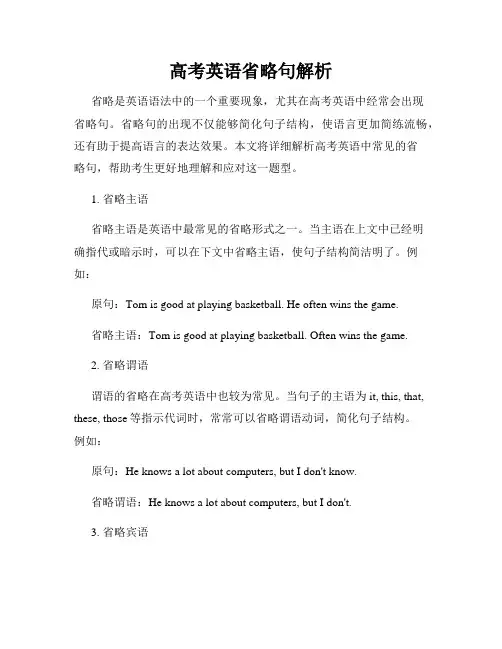
高考英语省略句解析省略是英语语法中的一个重要现象,尤其在高考英语中经常会出现省略句。
省略句的出现不仅能够简化句子结构,使语言更加简练流畅,还有助于提高语言的表达效果。
本文将详细解析高考英语中常见的省略句,帮助考生更好地理解和应对这一题型。
1. 省略主语省略主语是英语中最常见的省略形式之一。
当主语在上文中已经明确指代或暗示时,可以在下文中省略主语,使句子结构简洁明了。
例如:原句:Tom is good at playing basketball. He often wins the game.省略主语:Tom is good at playing basketball. Often wins the game.2. 省略谓语谓语的省略在高考英语中也较为常见。
当句子的主语为it, this, that, these, those等指示代词时,常常可以省略谓语动词,简化句子结构。
例如:原句:He knows a lot about computers, but I don't know.省略谓语:He knows a lot about computers, but I don't.3. 省略宾语宾语的省略是一种语言表达的简化方式。
当句子中的宾语是人称代词时,常常可以省略宾语,使句子更加简洁。
例如:原句:I saw him yesterday, but he didn't see me.省略宾语:I saw him yesterday, but he didn't see.4. 省略定语从句定语从句的省略在高考英语中也颇为常见。
当定语从句的主语和谓语与主句中的一致时,可以将定语从句中的主语和谓语省略,只保留从句中的关系词和其他修饰成分。
例如:原句:The book that I borrowed from the library yesterday is very interesting.省略定语从句:The book I borrowed from the library yesterday is very interesting.5. 省略介词短语在高考英语中,介词短语的省略也是一种常见现象。
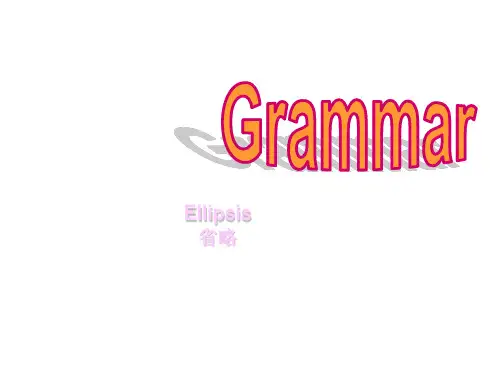
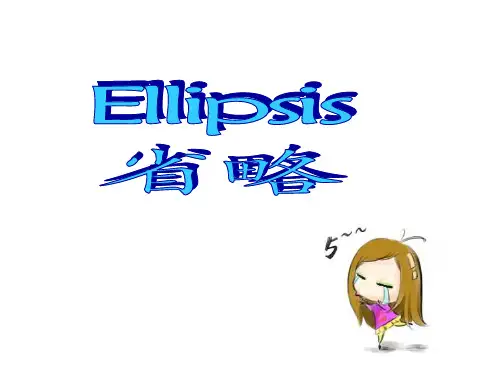

![[英语语法]省略句](https://uimg.taocdn.com/7c175fe8102de2bd96058823.webp)
省略句定义:为了使语言简洁或避免重复,要省略句中的一个或几个成分,这种语法现象称之为省略。
英语中省略现象较为普遍,对省略的考查已成为高考中的热点。
句子成分的省略,可分为以下几种情况:1.省略主语,主谓语或主谓的一部分2.不定式符号to的省略3.不定式结构中动词的省略4.状语从句中的省略5.定语从句中关系词的省略6.虚拟语气中if和should的省略7.考查not,so,neither,nor的“替代性”省略省略句常见情况具体分析:1,在有and连接的句子中为了避免重复,长省略一些重复的词或者词组:1),省略共同的主语或者宾语。
Mr Smith picked up a coin on the road and (Mr Smith) handed it to a policeman.2),若主语不同,而谓语,助动词或者情态动词相同,则省略后面的助动词或情态动词。
Jack must have been playing football and Mary (must have been ) doing her homework.3), 若主语与谓语动词相同,则省略后面的主谓成分。
His advice made me happy, but (his advice made) Jim angry.4),若主语不同的话,但主要动词及后续部分相同,则省略主要动词及后续部分。
I was born in winter 1998, and Bob (was born ) in 1989.5) 省略重复的介词,连词及后续部分。
He was late because he had overslept and (because he had ) missed the train.2,状语从句的省略1),在when, while, whenever, till, as soon as, if, unless, as if, though 等引导的状语从句中,其实是:包括时间,让步,方式等一些状语从句中,若从句主语和主句主语相同,或者是it时,且从句的主语为be动词时,则从句中的主语和be动词常全部被省略。
省略句定义:省略是一种修辞手段,省略的使用是为了避免重复。
同时,不损害句子结构,不会引起歧义。
一.功能词的省略1.冠词的省略1)两个并列名词前面都有冠词时,第二个名词前的冠词常可以被省略。
Can we have a medical examination at home without a doctor or (a) nurse?家里没有医生或护士我们能进行医疗检查吗?注意:有些句子如果省略了第二个冠词,会误认为指同一个人,省略时应注意。
They are the gardener and the gatekeeper.他们一个是花园园丁,一个是门卫。
2)表示头衔、职位,而不是这个职业所具体指的那个人时,常省略冠词。
Mary, head of our team, was determined to give up this game.我们的队长玛丽决定放弃这一局比赛。
2.介词的省略1)yesterday afternoon/evening/morning, Sunday, Saturday等时间名词前的介词常省略。
She started work (on) last Monday.她从上个星期一开始工作。
2)for引导的表示一段时间的名词短语,一般for可以省略。
I stayed in Washington (for) four years.我在华盛顿待了四年。
注意:在句首或在否定句中时,“for+一段时间”的短语中不能省略for.I haven't heard from him for a long time.我很长时间没有收到他的来信了。
For a whole year, I was helping my dad on the farm.一整年我都在农场帮我爸爸。
3)of与age, size, color, height, material, shape等表示大小、长短、颜色、年龄、形状、高度等的名词连用时,常被省略。
省略句一、状语从句的省略1、从句主语与主句主语一致(it)2、从句中含有be,省略主语+bee.g. While (he was) watching TV , he heard a knock at the door.While (he was) in America , he picked up some English.If (it is ) heated , water boils.When seeing his mother , the baby cried.……the baby sa w……When to do疑问词+分词(状语)疑问词+不定式(主语/宾语/表语)e.g. When to have a meeting is not decided.He has no room to put his books in.……in which to put his books.if ever/ if not/ if any /if possible二、不定式的省略1、e.g. --Would you like to go with me?--l’d like to.He is not what he used to be.2、be 不省三、e.g. than it actually isWe are both foolish.How foolish we both are!Tom plays football as will as , if not better than Mike.四、I think so/l don’t think so.I hope so/l hope notI’m afraid so/l’m afraid not。
英语省略句语法省略I.要点有时为了避免重复,使语言简练紧凑,在不损害结构或引起误解的原则下,往往省去一个或多个句子成分或词语。
1、固定习惯用词。
如:No smoking! Thanks s lot!等。
2. 简单句中的省略(1)口语中,一、二、三人称的主语,有时还包括谓语都可以省略。
如:(It is)Nice to see you!(This is) Li Ming speaking.(2)所有格后的名词如为住宅、商店、工矿、教堂等可以省略。
如:I'm going to visit Tom's (house).I met him at the tailor's (shop).(3)两个或两个以上的动词不定式并列在一起时,第一个不定式带to,后面的不定式可省to.如: His job is to clean and mend the machine.(4)主(宾)语补足语中的to be常省略。
He was considered (to be) the best student in the class.(5)There be结构中there be可同时省略,或只省略there.如:(Is there) Anything wrong?(6)表示年龄的years old, 表示钟点的o'clock, minute等常省略。
如:What time is it now? It's ten (o'clock).3从句中的省略(1)宾语从句,以which, when, where, how和why引起的宾语从句谓语与主句谓语如相同,可省略从句中全部谓语,甚至主语也可省略,仅保留wh-一词。
如:He will come, but we don't know when (he will come).He didn't come, I wondered why (he didn't come).(2)定语从句中可省略作宾语的关系代词,如:The man (whom) I saw in the street the other day is my teacher.(3)状语从句,在时间、地点、让步、方式、条件状语从句中,从句主语与主句主语一致,或从句主语是it,则be动词及其主语常可省略。
完整版)高中英语语法省略句Ellipsis is XXX omitting certain words。
phrases。
or XXX in order to make the XXX.One type of ellipsis is the n of the subject and predicate of a sentence。
XXX.For example。
"Beautiful day。
isn't it?" instead of "It is a beautiful day。
isn't it?"Another type is the n of the predicate。
XXX.For example。
"Pity we live so far from the sea" instead of "It is a pity we live so far from the sea."XXX。
XXX.For example。
"Seen from the plane。
the house looks XXX."When the infinitive is followed by the perfect tense。
the infinitive XXX.For example。
"The boy wanted to ride his bicycle in the street。
but his mother told him not to."In cases where the infinitive is followed by the verb "be," the verb "be" should be retained.For example。